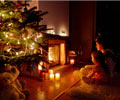Valentina Zhigulina sounds less than festive as she displays her stack of Christmas trees at a central Moscow bazaar.
"They're rather prickly," she warns.And not just prickly: the typical, khaki-coloured Russian Christmas tree is spindly, sheds needles in a hurry, and appears to have been battered in a Siberian storm.
As Yelena, a Moscow city employee shopping under a light snowfall, said: "These trees look empty however much decorations you hang on them."
Russia, the country with the world's biggest spread of forests, including half of the planet's coniferous stocks, is a strangely difficult place to get a decent Christmas tree.
And the reason, say economists and ecology experts, goes to the root of the messy way that business is done here 16 years after Soviet communism collapsed.
On the face of things, Russians should have plenty of choice when picking what they call the New Year's "yolk."
Advertisement
However, at any of the thousands of mini-bazaars that spring up in December shoppers are confronted either by a sickly home-grown effort, or a luxurious and wildly priced Danish import.
Advertisement
But where a two-metre Russian "yolk" costs about 1,250 rubles (50 dollars, 35 euros), its deep-green, healthy looking European rival costs 4,900 rubles (200 dollars, 138 euros) -- half the average Russian monthly salary.
Experts say that gap in quality and price reflects the difficult climate for small and medium business investment here.
The country is the world's biggest energy exporter and a powerhouse for big-ticket, state-produced items like space rockets. But Russia has yet to produce an internationally competitive toaster, computer -- or Christmas tree.
Denis Doren, director of the tree firm Yolky, said imported trees "are grown by specialists in high-tech nurseries. Here, there are no real nurseries -- it's all half-wild. They're just grown without care, then chopped down."
Economist Mikhail Delyagin said that setting up a decent tree farm in Russia is simply too complicated, since it demands heavy initial investment, and years of growing time. "A small business can't think that far ahead because of political uncertainty."
Besides, if a farmer opts for the higher end of the market, he'll only end up more exposed to corruption, which is rife in Russia and particularly notorious in the forestry sector, where the likely next president, Dmitry Medvedev, worked in the 1990s.
"Grow a beautiful tree and it will cost you a lot. After that, you will have to pay (bribes) left and right," Delyagin said. "It's easier just to get any old plot and grow something worse."
Those plots, says Ivan Yakubov, editor of Russian Forestry magazine, are often "wasteland, or located under high-voltage electricity lines."
At the Russian branch of the WWF environmental activists group, Alexei Waisman even accuses farmers of using growth hormones to make the firs "grow more than twice as fast as usual, which is why they look so thin."
At least for the privileged, Russia is a Christmas tree paradise.
Last week a massive 109-year-old fir was chopped down outside Moscow and delivered by truck to the Kremlin, while those with deep pockets can choose Danish beauties.
For the rest, December is a time of cheerfully making-do.
Mikhail Seleznev, a 22-year-old engineer surveying the sorry collection at Zhigulina's bazaar, said the Russian trees looked "lost."
"But you know, I'll probably get one of them after all -- and I'll find some way really to make it special!"
Source-AFP
LIN/M











